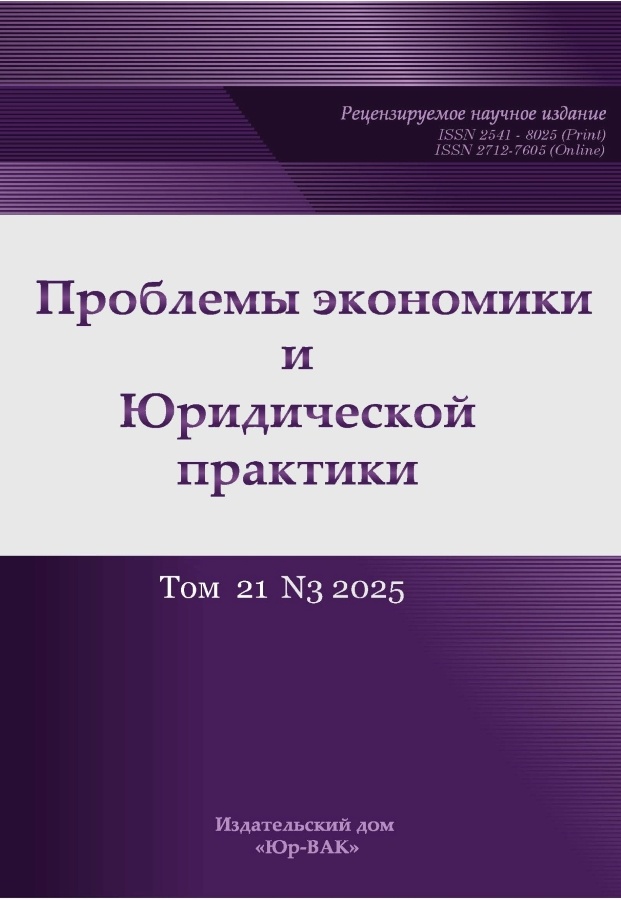Nonparametric Approach to Regression Modeling Based on Copula Functions: Application to Bivariate Models
- Authors: Bachaev U.A.1
-
Affiliations:
- Financial University under the Government of the Russian Federation
- Issue: Vol 21, No 3 (2025)
- Pages: 136-145
- Section: Mathematical, Statistical and Instrumental Methods in Economics
- URL: https://journals.eco-vector.com/2541-8025/article/view/688025
- DOI: https://doi.org/10.33693/2541-8025-2025-21-3-136-145
- EDN: https://elibrary.ru/WXJQND
- ID: 688025
Cite item
Abstract
This paper explores a nonparametric approach to regression modeling based on copula functions, which overcomes the limitations of classical linear models. The study analyzes the advantages of the copula approach, including the ability to model complex nonlinear, asymmetric, and tail dependencies, as well as the separation of dependence structure and marginal distributions. The main classes of copulas (elliptical and Archimedean), their properties, and their application in bivariate models are discussed. Special attention is paid to practical examples of copula applications in economics and finance. The advantages of the approach, such as flexibility and universality, are highlighted, along with its limitations related to computational complexity and data quality requirements.
Full Text
About the authors
Umar A. Bachaev
Financial University under the Government of the Russian Federation
Author for correspondence.
Email: UABachaev@fa.ru
ORCID iD: 0000-0003-4109-8596
SPIN-code: 8029-6668
Scopus Author ID: 996707
ResearcherId: AEB-0730-2022
Assistant of the Department of Information Technology; Financial University under the Government of the Russian Federation
Russian Federation, MoscowReferences
- Fantazzini, D. (2008). Econometric analysis of financial data in risk management problems. Applied Econometrics, 2(10), 91–137.
- Fantazzini, D. (2011). Modeling multivariate distributions using copula functions. I. Applied Econometrics, 22(2), 98–134.
- Fantazzini, D. (2011). Modeling multivariate distributions using copula functions. II. Applied Econometrics, 23(3), 98–132.
- Fantazzini, D. (2011). Modeling multivariate distributions using copula functions. III. Applied Econometrics, 25(4), 100–130.
- Dißmann J., Brechmann E. C., Czado C., Kurowicka D. Selecting and estimating regular vine copulae and application to financial returns // Computational Statistics & Data Analysis. —2013. —Vol. 59. —P. 52–69.
- Masarotto G., Varin C. Gaussian copula marginal regression // Electronic Journal of Statistics. —2012. —Vol. 6. —P. 1517–1549.
- Masarotto G., Varin C. Gaussian Copula Regression in R // Journal of Statistical Software.—2017.—Vol. 77, No. 8.
- Wei Y., Wojtyś M., Sorrell L., Rowe P. Bivariate copula regression models for semi-competing risks // Statistical Methods in Medical Research. —2023.
- Yang L., Frees E. W., Zhang Z. Nonparametric Estimation of Copula Regression Models with Discrete Outcomes // Journal of the American Statistical Association. —2020. —Vol. 115, No. 530. —P. 707–720.
- Kraus D., Czado C. D-vine copula based quantile regression // Computational Statistics & Data Analysis. —2017.
- Dette H., Siburg K. F., Stoimenov P. A. A Copula-Based Nonparametric Measure of Regression Dependence : препринт 2010–03. —Technische Universität Dortmund, 2010.
- Parsa R. A., Klugman S. A. Copula Regression // Variance: Advancing the Science of Risk. —2011. —Vol. 5, No. 1. —P. 45–61.
Supplementary files













